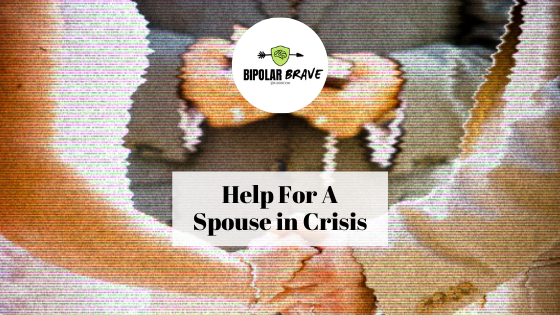Being a caregiver to someone with a brain-based chronic condition can be taxing and require all the resources you can possibly find, especially for a spouse in crisis. Here are a few preventative-type steps to take and what resources to look for, plus what to do in a crisis:
Go With Your Spouse to Her Appointments If You Can
My first recommendation would be to find a good psychiatrist who takes your health insurance and make an appointment for your spouse.
Whether she will cooperate and go may be another thing, especially if she is experiencing symptoms of an acute serious mental illness episode. Symptoms can include delusions, paranoia, thoughts of grandeur, hyper-sensitivities, hallucinations, suicidal thinking, and having a plan to execute suicide.
In A Crisis, Have a Plan Before It Happens
If there is extreme resistance to her seeing the doctor, and symptoms are acute, call your nearest psychiatric hospital to see if they have any bed openings.
Most stays are no more than 3-5 days long, but they can monitor her for any dangerous tendencies.
If she is willing to go voluntarily and be seen for her symptoms, you might attempt to take her yourself. Pack a few days’ worth of items she may need like clothing and toiletries. Remember to leave out shoe strings, belts, razors, or things that can pose hazardous.
Having been in this position before (as the sick spouse), your spouse should be able to understand you. Explain to her you want her to get better and that she’ll feel better after a temporary stay. Let her know she will be where the doctors can monitor her and give her medication that will help her feel better.
If There Is No Getting Through To Them
For a spouse who is resistant to this, and there is no reasoning or talking sense into her, if symptomatic behaviors persist, you may need to call 911. Let her know you are doing this, and don’t react if she is panicked. But do follow through, especially if she is in imminent danger of being a harm to herself or others.
Once you both get to the hospital, she can give you the rights to her PHI (personal health information). Encourage her to include you on the forms. It is her right, but be aware that if she isn’t in her right mind, she can refuse to give you rights to her PHI. This is where having a Medical POA or Healthcare Proxy can come into play. Always consult an attorney for legal advice in this area.
Acute serious mental illness episodes and the crises that come with it are real and can be scary. All the more should you and your spouse find the right care in the right time.
When Not In Crisis
In a mild episode or balanced state when symptoms are not so acute, I would encourage you to check out the following resources:
Support Groups – in person and virtual:
- Fresh Hope for Mental Health in person and Fresh Hope for Mental Health virtual
- Grace Alliance in person and Grace Alliance virtual
- My Quiet Cave in person and My Quiet Cave virtual
- NAMI in person
Facebook Groups – may require an application for admission:
- Hope For Troubled Minds
- Embracing Faith and Mental Illness From a Caregiver’s Perspective
- You Are Not Alone: Mental Illness Support and Resources
- Faith & Mental Wellness Community (Christians Mental Health)
- The Bipolar Experience
- Assisted Outpatient Treatment for Serious Mental Illness
GAMEPLAN: Mental Health Resource Guide – to keep all the mental healthcare info in one place, with customizable entries and more recommended resources.
Stay brave,
Katie

What do you think?